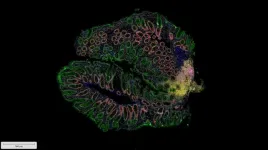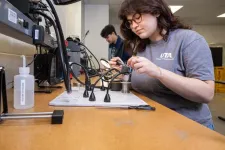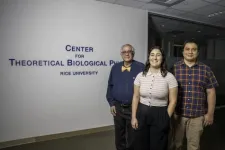(Press-News.org) UK survey examines consumer attitudes towards and willingness to consume insect-based foods.
Only 13% of respondents said they would be willing to regularly consume insects, with younger respondents less willing to give insects a try, as were those with higher sensitivity to food disgust.
*Please mention the European Congress on Obesity (ECO 2024, Venice,12-15 May) if using this material*
New research being presented at this year’s European Congress on Obesity (ECO) in Venice, Italy (12-15 May), finds that insect-based foods remain unappealing in the UK, and more needs to be done to change attitudes towards and willingness to consume insects, as a potential avenue for more sustainable food production which could reduce the carbon footprint of UK consumers.
Food production accounts for up to a quarter of all human greenhouse gas emissions. Livestock is a huge contributor to these emissions and researchers and policymakers are trying to develop and promote more sustainable ways to produce protein. One option gaining attention is farming and eating insects, such as crickets, flies, and worms, due to their potential nutritional and environmental advantages over other protein sources.
“Insects are a potentially rich source of protein and micro-nutrients and could help provide a solution to the double burden of obesity and undernutrition”, says lead author Dr Lauren McGale from Edge Hill University, UK. “Some insect proteins, such as ground crickets or freeze-dried mealworms, are cheaper and easier to farm, often lower in fat and have a lower environmental impact than traditional livestock.”
Despite these benefits, people in Western countries rarely eat insects, and many people are disgusted at the thought of insect-based food. Nevertheless, people are happy to eat lobster or crayfish despite their insect-like appearance, so it is possible attitudes could change.
To identify factors which may affect willingness to consume insects and to establish existing experience with insect-based food in the UK, researchers conducted an online survey of 603 UK adults (average age 34 years; 76% female) between 2019 and 2020, recruited using the Prolific recruitment platform—a large database of people from across the UK who have agreed to take part in research.
In the survey, participants were asked about their demographics (e.g., age, gender, ethnicity, and education level) and socioeconomic status as well as their level of concern about the environment.
Respondents were also asked to complete a Food Disgust Scale to measure how disgusting they find certain food-related situations, in order to determine their individual food disgust sensitivity. For example, participants are asked to rate their disgust at less commonly eaten parts of animals (such as organs, jaws, etc.), or their disgust response to food which had gone mouldy or had fallen on the floor.
They were also asked questions about anticipated taste/sensory perceptions, for example, how sweet, savoury, crunchy or slimy they anticipated insects to be in general, and their willingness to consume insects regularly.
The survey reveals that perception’s about insects’ taste or sensory properties were not generally favourable, with participants tending to rate them lower on visual or smell appeal, and anticipating lower levels of enjoyment, liking, or sweetness, and higher levels of savouriness, saltiness, and bitterness [1].
Overall, only 13% of respondents said they would be willing to regularly consume insects, compared to 47% who said they would not be willing, and 40% who responded maybe or that they were unsure.
Younger respondents were less open to consuming insects regularly, with each year younger being associated with a 2% increase in responding ‘no’ when asked if they would be willing to consume insects regularly.
Furthermore, as expected, levels of general food disgust predicted openness to consuming insects, with each point increase on the Food Disgust Scale predicting a 4% increase in saying ‘no’ to consuming insects.
Interestingly, disgust ratings were significantly higher for powdered insects than for whole insects. However, respondents' willingness to consume insects was also significantly higher for powdered insects than for whole insects despite higher levels of disgust.
“The disgust factor associated with eating whole insects could be overcome by incorporating insect flours into processed foods. This has been done successfully with rice products fortified with cricket or locust flours in other parts of the world”, says co-author Dr Maxine Sharps from De Montfort University, UK. “But if insects are to be a mainstream part of the Western diet, the disgust factor is one of most important challenges to be overcome. Afterall, there may be eventually no choice with climate change and projected global population growth.”
END
UK survey finds “disgust factor” needs to be overcome if eating insects is to become truly mainstream
2024-05-14
ELSE PRESS RELEASES FROM THIS DATE:
Could WhatsApp profile pictures help obesity doctors spot patients with body dysmorphia?
2024-05-14
New research being presented at the European Congress on Obesity (ECO) in Venice, Italy (12-15 May) has found that many people who are living with obesity conceal their body in their WhatsApp profile pictures.
Profile pictures of pets, family members, landscapes, flowers and cartoon characters may indicate the individual has body dysmorphic disorder, says lead Dr Antonella Franceschelli, of Unicamillus International Medical University, Rome, Italy.
Body dysmorphic disorder is a condition in which a person has a distorted image of their body. They feel dissatisfied with their physical appearance, may experience shame or anxiety about their body and, in the case ...
It’s time to use TikTok to talk to young people about obesity
2024-05-14
There is an urgent need to harness the potential of TikTok and other social media channels to provide scientific information about obesity to young people in engaging and accessible way, the European Congress on Obesity (ECO) in Venice, Italy (12-15 May) will hear.
The popularity and broad reach of such platforms provides the opportunity to reach diverse audiences, including teenagers and young adults, explains lead researcher Dr Antonella Franceschelli, of Unicamillus International Medical University, Rome, Italy.
The percentage of obese children and adolescents worldwide more than quadrupled among girls (from 1.7% to 6.9%) ...
Allen Institute for Immunology and Seattle Children’s Research Institute launch study to unravel molecular mysteries of pediatric IBD
2024-05-13
By Jake Siegel
Seattle, WA—May 13, 2024—With pediatric inflammatory bowel disease (IBD) diagnoses on the rise globally, a clinical trial in Seattle aims to transform treatment approaches through deep molecular profiling.
Recruitment has begun for the Seattle STRIDE study, a joint effort by Seattle Children’s Research Institute and the Allen Institute for Immunology. The trial aims to enroll 200 volunteers and follow them over three years. It will employ a range of genomic tools to analyze intact tissue samples from routine tests. ...
Impact Journals at SSP 46th Annual Meeting
2024-05-13
Impact Journals is proud to participate at the Society for Scholarly Publishing (SSP) 46th Annual Meeting.
BUFFALO, NY- May 13, 2024 – Impact Journals is proud to participate as an exhibitor at the Society for Scholarly Publishing (SSP) 46th Annual Meeting, which convenes in Boston, Massachusetts, at the Westin Boston Seaport District from May 29–31, 2024. This year, the SSP Annual Meeting theme is “Inflection Point: Setting the Course for the Future of Scholarly Communication.”
Visit booth #212 at the SSP 46th Annual Meeting 2024 to connect with members of the Impact Journals team.
About ...
UTA receives Innovation and Economic Prosperity designation
2024-05-13
UTA has recently received the Innovation and Economic Prosperity (IEP) designation from APLU, the Association of Public and Land Grant Universities.UTA has recently received the Innovation and Economic Prosperity (IEP) designation from APLU, the Association of Public and Land Grant Universities.UTA has recently received the Innovation and Economic Prosperity (IEP) designation from APLU, the Association of Public and Land Grant Universities.UTA has recently received the Innovation and Economic Prosperity (IEP) designation from APLU, the Association of Public and Land Grant ...
Texas Tech researchers help confirm first case of avian influenza transmitted from cow to human
2024-05-13
Texas Tech University’s Biological Threat Research Laboratory (BTRL) played a key role in detecting the first case of highly pathogenic avian influenza (HPAI) A (H5N1) transmitted from a mammal (dairy cow) to a human.
The case was made public in an article published in the New England Journal of Medicine. Steve Presley, the director of The Institute of Environmental and Human Health (TIEHH) and the BTRL, and Cynthia Reinoso Webb, the biological threat coordinator at TIEHH, were co-authors on the journal publication.
The journal article explains that in March a farm worker who reported no contact with ...
Coming out to a chatbot?
2024-05-13
Today, there are dozens of large language model (LLM) chatbots aimed at mental health care — addressing everything from loneliness among seniors to anxiety and depression in teens.
But the efficacy of these apps is unclear. Even more unclear is how well these apps work in supporting specific, marginalized groups like LGBTQ+ communities.
A team of researchers from the Harvard John A. Paulson School of Engineering and Applied Sciences, Emory University, Vanderbilt University and the University of California Irvine, found that while large language models can offer fast, on-demand support, they frequently fail to grasp the specific challenges that many members ...
Persistent strain of cholera defends itself against forces of change, scientists find
2024-05-13
A deadly strain of cholera bacteria that emerged in Indonesia back in 1961 continues to spread widely to this day, claiming thousands of lives around the world every year, sickening millions — and, with its persistence, baffling scientists. Finally, in a study published today in Nature, researchers from The University of Texas at Austin have discovered how this dangerous strain has held out over decades.
A longstanding mystery about the strain of Vibrio cholerae (V. cholerae) responsible for the seventh global cholera pandemic is how this lineage has managed ...
Rice study reveals insights into protein evolution
2024-05-13
Rice University’s Peter Wolynes and his research team have unveiled a breakthrough in understanding how specific genetic sequences, known as pseudogenes, evolve. Their paper was published May 13 by the Proceedings of the National Academy of Sciences of the United States of America Journal.
Led by Wolynes, the D.R. Bullard-Welch Foundation Professor of Science, professor of chemistry, biosciences and physics and astronomy and co-director of the Center for Theoretical Biological Physics (CTBP), the team focused on deciphering the complex energy landscapes of de-evolved, putative protein sequences corresponding to pseudogenes.
Pseudogenes are ...
Low testosterone in men associated with higher risk for death
2024-05-13
Embargoed for release until 5:00 p.m. ET on Monday 13 May 2024
Annals of Internal Medicine Tip Sheet
@Annalsofim
Below please find summaries of new articles that will be published in the next issue of Annals of Internal Medicine. The summaries are not intended to substitute for the full articles as a source of information. This information is under strict embargo and by taking it into possession, media representatives are committing to the terms of the embargo not ...



